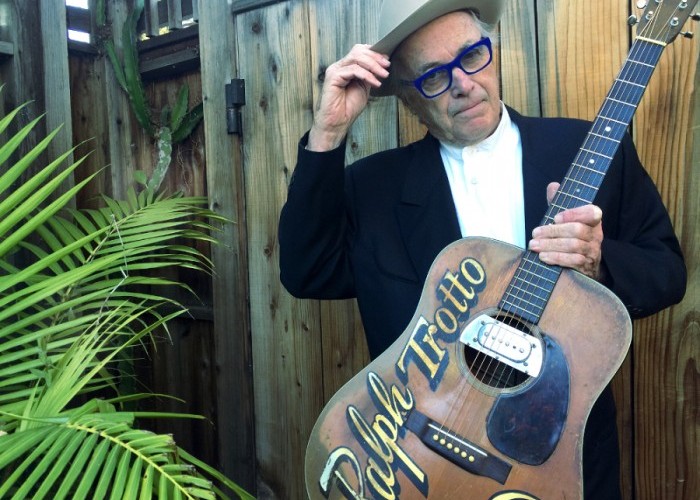Jan 13, 2026 2:09 PM
More Trump-Kennedy Center Cancellations
The fallout from the renaming of the John F. Kennedy Center for the Performing Arts to include President Donald…

Ry Cooder will be on tour this summer promoting his new album, The Prodigal Son.
(Photo: Joachim Cooder)As a follow-up to 2012’s Election Special (Nonesuch)—a biting protest album that critiqued right-wing politics—guitar ace Ry Cooder and his drummer-producer son, Joachim, decided to take a different approach with their new recording, The Prodigal Son (Fantasy).
“Joachim warned me: ‘Don’t get too heavy-handed now. Nobody wants to hear about politics anymore. Let ’em rest a little,’” Cooder said. “So, I thought I’d take that advice seriously.”
With its prevalence of gospel tunes by the likes of Blind Willie Johnson, Blind Roosevelt Graves, Alfred Reed and William L. Dawson, along with three potent Cooder originals, The Prodigal Son has a more hopeful mood and, in some ways, is a throwback to Cooder classics like 1974’s Paradise And Lunch, which included a rendition of “Jesus On The Mainline,” or his eponymous 1970 debut as a leader, which had the 24-year-old delivering faithful renditions of Reed’s “How Can A Poor Man Stand Such Times And Live?” and Johnson’s “Dark Was The Night, Cold Was The Ground.”
The difference with The Prodigal Son is that Cooder, 71, has developed a grittier vocal style that puts him squarely in the Howlin’ Wolf zone, while Joachim has concocted some dreamy backgrounds for his father to sing on, including a trance-like version of the Pilgrim Travelers’ 1955 tune “Straight Street,” a take on “Nobody’s Fault But Mine” that Cooder described as “Blind Willie Johnson on Mars,” and a shimmering reimagining of the Stanley Brothers’ gospel classic “Harbor Of Love.”
“I’ve been doing this kind of work for a long time—taking older songs and adapting them in some way—but I couldn’t have made this particular record back then,” said Cooder, who sings and plays slide guitar, resonator and mandolin with rare expressive powers throughout the album. “We didn’t have all this gas in the tank back then. We’re working with technology that didn’t exist in the ’70s.”
Joachim constructed backing tracks on some tunes by sampling and looping fragments of his father’s playing, creating a tonal center for Cooder to sing and play over. “When I hear these things in the headphones, I get ideas,” Cooder said. “I don’t have to worry about it as an arrangement—it just comes to me. So, I have a freer time doing it this way.”
Cooder’s infatuation with gospel music and spirituals goes back to his teenage years. “In the early ’60s, stuff became available on records that had not been available before,” he said. “Santa Monica, where I have always lived, is not a town where you will find storefront Church of God in Christ churches. So, the whole idea of gospel quartet singing is something I never knew existed, until I began to hear it on record. I liked it then, and it’s still my favorite kind of music.”
A turning point for the budding record collector was hearing a 1952 Folkways LP by Sonny Terry, Brownie McGhee and Coyal McMahan titled Get On Board: Negro Folksongs By The Folkmasters. “They do ‘In His Care’ and ‘I Shall Not Be Moved’ on there, and it just grabbed me,” he recalled. “I wanted to hear more of it, understand it a little bit more.”
Around the time of his gospel epiphany, the Ash Grove in Los Angeles began booking groups like the Staples Singers and the Chambers Brothers (before they went psychedelic). “It was amazing to hear them singing just eight feet away onstage,” Cooder recalled. “When you hear that live for the first time in your life, it’s an unbelievable impact. I was just spellbound. It’s something that you walk away from going, ‘I feel like I’m a different person having heard this.’”
Cooder—who would eventually play the Ash Grove himself in 1963, backing singer Jackie DeShannon as a 16-year-old fingerpicking wunderkind—now credits records for putting him on his current path: “If it hadn’t been for record people like Ralph Peer, the Chess brothers and Alan Lomax, then life would’ve been unbelievably dull, and I would’ve been sacking groceries somewhere, and probably at this point running a little 7-Eleven down by the airport.”
By perpetuating classic roots music, The Prodigal Son might grab some young fan the way Get On Board grabbed Cooder back in the day.
Cooder’s 24-city tour of the States this summer will be followed by a European tour in the fall. Joachim will open each show with his renegade trio, performing tunes from his EP, Fuchsia Machu Picchu—which features contributions from his father and a cameo by Vieux Farka Touré, who plays guitar on one track. DB

Belá Fleck during an interview with Fredrika Whitfield on CNN.
Jan 13, 2026 2:09 PM
The fallout from the renaming of the John F. Kennedy Center for the Performing Arts to include President Donald…

Peplowski first came to prominence in legacy swing bands, including the final iteration of the Benny Goodman Orchestra, before beginning a solo career in the late 1980s.
Feb 3, 2026 12:10 AM
Ken Peplowski, a clarinetist and tenor saxophonist who straddled the worlds of traditional and modern jazz, died Feb. 2…

The success of Oregon’s first album, 1971’s Music Of Another Present Era, allowed Towner to establish a solo career.
Jan 19, 2026 5:02 PM
Ralph Towner, a guitarist and composer who blended multiple genres, including jazz — and throughout them all remained…

Rico’s Anti-Microbial Instrument Swab
Jan 19, 2026 2:48 PM
With this year’s NAMM Show right around the corner, we can look forward to plenty of new and innovative instruments…

Richie Beirach was particularly renowned for his approach to chromatic harmony, which he used to improvise reharmonizations of originals and standards.
Jan 27, 2026 11:19 AM
Richie Beirach, a pianist and composer who channeled a knowledge of modern classical music into his jazz practice,…